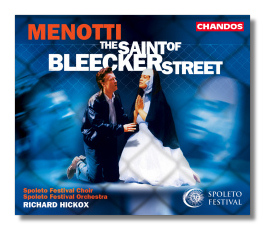
The Internet's Premier Classical Music Source
Related Links
- Latest Reviews
- More Reviews
-
By Composer
-
Collections
DVD & Blu-ray
Books
Concert Reviews
Articles/Interviews
Software
Audio
Search Amazon
Recommended Links
Site News
 CD Review
CD Review
Gian Carlo Menotti

The Saint of Bleecker Street
- Julia Melinek (Annina)
- Timothy Richards (Michele)
- Pamela Helen Stephen (Desideria)
- John Marcus Bindel (Don Marco)
- Sandra Zeltzer (Carmela)
- Amelia Farrugia (Maria Corona)
- Yvonne Howard (Assunta)
- Vitali Rozynko (Salvatore)
Spoleto Festival Choir and Orchestra/Richard Hickox
Chandos CHAN9971(2) DDD 2CDs 51:20, 73:32
The profane and the profound, the lurid and the saintly, rub elbows in Menotti's operas. In The Saint of Bleecker Street, religious faith and disbelief are interwoven with drunken outbursts, taunts, and a stabbing. It's as if Puccini's Suor Angelica and Il Tabarro had been crossed with Gershwin's Porgy and Bess. The plot concerns the fragile Annina, a girl revered in New York's Little Italy because of her supposed ability to heal the sick. She hears voices, sees visions, and receives the stigmata as she vicariously relives the Passion of Jesus Christ. Her obsessively devoted brother Michele rejects these phenomena, believing them simply to be mumbo-jumbo imagined or thrust upon her by others. He denies her one surpassing wish, which is to take the veil. When Michele's mistress Desideria, provoked by his unwillingness to make an emotional commitment to her, accuses him of really being in love with his sister, the enraged Michele (the truth hurts, doesn't it?) stabs Desideria in the back. Michele, now a fugitive from the law, sneaks back to his cold-water flat to find his sister, dying, about to take the veil. Annina, seemingly oblivious to her brother's presence, collapses – dead – and the priest Don Marco places the ring on her finger, eternally uniting her in marriage to Christ.
Like several of his earlier operas, Menotti's The Saint of Bleecker Street premièred on Broadway; the year was 1954. Revivals at the New York City Opera and at the Festival of Two Worlds confirmed its viability as an opera. Shortly after its première, it received an "original cast recording" from RCA Victor; Gabrielle Ruggiero, David Poleri, and Gloria Lane took the lead roles, and Thomas Schippers was the conductor. This monaural recording was slightly cut. I don't believe The Saint of Bleecker Street has been recorded again until now.
This new recording is taken from live performances in Spoleto, Italy. As a live recording, it has more dramatic impact than the sometimes studio-bound RCA recording, and it obviously boasts better sound. Hickox is a surprisingly sympathetic advocate for Menotti (he has three other Menotti CDs to his credit, including The Consul), although Schippers is even more dedicated and understanding. Both conductors benefit not from star-power but from a strong vocal ensemble. (This opera has a large cast, and Menotti allows himself many colorful episodes to offset the drama.) Melinek, not always pure of tone, is a convincing Annina, but it is Timothy Richards as her brother Michele who really impresses. His is a violent, haunted portrayal, and excellently sung. Pamela Helen Stephen (Hickox's wife) also pours it on as Desideria; part Santuzza, part Carmen, Stephen makes the most of her puzzling, equivocal role. John Marcus Bindel's steady Don Marco also deserves to be singled out. Overall, the RCA Victor cast has better voices, but the Chandos cast uses their voices more effectively.
The 180-page libretto includes photos from the Spoleto production, plus the expected essays, texts, and translations.
Although not the freshest cannoli on the counter, The Saint of Bleecker Street retains its visceral impact, and this new Chandos recording serves it well.
Copyright © 2002, Raymond Tuttle


















